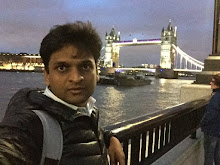A Cappella is a form of music that is performed by a group of singers without any musical accompaniment. A Cappella is one of the scarcely used genres in the ever progressive potpouri of global sounds and music styles that is Indian film music. Is the religious connotation that comes attached with a cappella stopping our composers from using this style of music in our films? Well, whatever.
A.R.Rahman’s ‘Please Sir’ from Boys, ‘Raasaathi’ from Thiruda Thiruda, ‘Namachivaaya Vazhgha’ from Ilaiyaraaja’s Thiruvasagam and ‘Mudhal Mazhaiyae’ from Devan Ekambaram’s pop album Mudhal Mazhai are the songs that immediately comes to my mind when I think of full length true-to-genre a cappella songs that I have heard. ‘Mudhal Mazhaiyae’ is a gem that stunned me when I first heard it and I wrote about the song and the whole album here.
The song ‘Happy’ in the latest ‘Bale Pandiya’ is an A Cappella. Devan’s a cappella in this song is not as intricate a cappella as it is in a Thiruvasagam; it is more sprightly and lighter, just as it was in his ‘Mudhal Mazhaiyae’, because the subject matter of the song is such. It would become heavy and deep, if there are too many accompanying layers of vocals singing contrapuntal melodies on varied octaves. This song is all about the happiness, the lightness and small pleasures of life. The song’s intention is to touch our senses like how a feather dancing all its way through a cool breeze gently falls on and sweetly pinches our skin. In this song, while the melody is like that feather, the accompanying vocal harmonies push the melody up and down, left and right to sail it throughout the song. This swinging and pushing in an uncertain direction by the breeze – the accompanying harmonies, is important because the feather – the melody, in itself doesn’t twist of turn throughout its journey and this could make the song sound long and monotonous.
Though we tag it as a cappella, this song is like any other typical film song that comes with a main lead vocal, a rhythm layer, a bass layer and accompanying orchestral instruments but the difference here is that a human voice sings the bass riff and bass line with vocal chords, fingers snapping sound layer instead of an acoustic percussion, the vocal to-to-toos substitute for additional rhythm loops and accompanying vocal harmonies pass in and out of the song, singing ooh-aah-taara version of melody lines – joining and supporting the lead solo voice, at carefully chosen sync points in the main melody.
The other highlight of the song is the array of singers that Devan managed to put together. Malaysia Vasudevan, Naresh Iyer, Devan, Suchitra Karthik, Haricharan, Srinivas, Malgudi Shubha, Manicka Vinayakam, Mukesh, Vijay Yesudass, Rahul Nambiar, Anuradha Sriram, Paravai Muniyamma and few others - each sings a part that best suits their voice in their unique style. And when the song slowly reaches a crescendo in the end, it gets dense, with a downpour of distinct alaaps being performed in multiple layers, by each of the lead voices. Despite its complexity, Devan pulls it off quite effectively without the song ever bordering on cacophony, which it could easily become, if such a thing is not done carefully.
In an age when every single song is packed densely with more and more layers of sounds and instruments, it is great relief to listen to a song like this, without any sound gimmicks or glaring instrumentation.
Devan Ekambaram – Happy! I am so Happy!
Showing posts with label Thoughts on Songs. Show all posts
Showing posts with label Thoughts on Songs. Show all posts
4.23.2010
Bale A Cappella
Posted by P.S. Suresh Kumar at 4:52 PM 12 comments
Labels: A Cappella, Bale Pandiya, Devan Ekambaram, Mudhal Mazhai, Thoughts on Songs
Subscribe to:
Posts (Atom)


